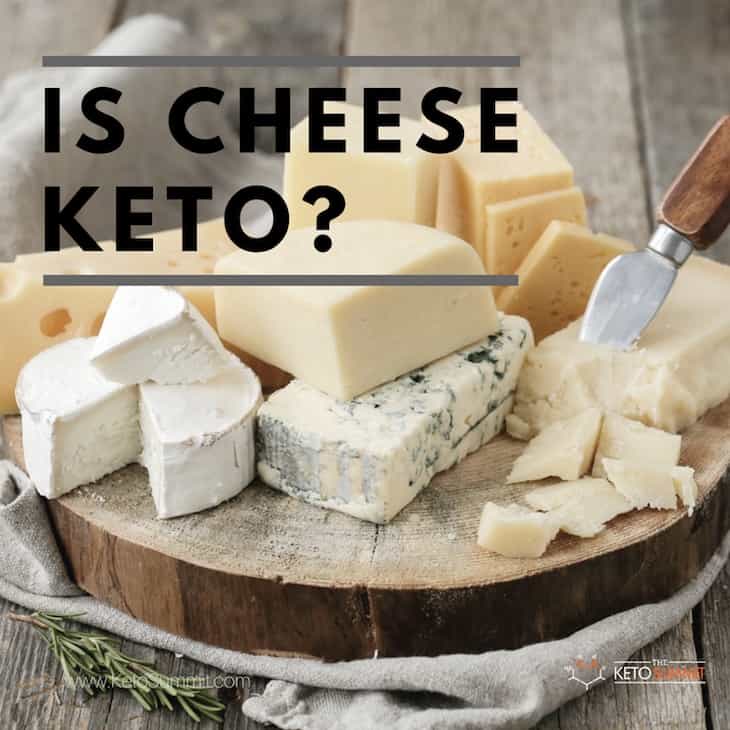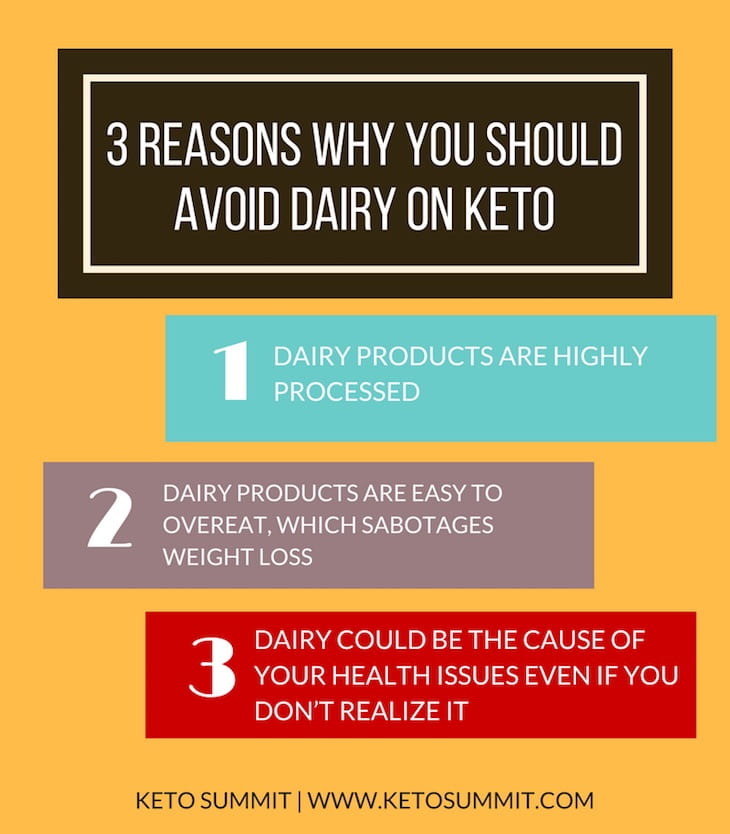Is Cheese Keto? Why Dairy Might Not Be As Healthy As You Think!

Cheese seems perfect for the keto diet – it’s high in fat while containing very few carbohydrates, so it’s a good match for the keto diet nutrient ratios.
But it’s actually a food you’ll want to avoid.
I absolutely love cheese. And I honestly miss the days of eating it… But I feel so much better after cutting it out – my digestive issues eased up and my skin cleared up – so it’s been worth it.
Many keto dieters initially think adding more cheese to their diet is a good idea and it’s also why many keto diet recipes contain large amounts of dairy.
Unfortunately, like all dairy products, cheese is best avoided.
Want to know why? Below are 3 main reasons for why you may want to cut all dairy (including cheese) from your diet… (plus one exception).
3 Reasons Why You Should Avoid Cheese (and Other Dairy Products) on Keto
1 – Dairy products are highly processed
The healthiest way to do the Keto diet is by sticking to unprocessed whole foods – and that’s why you’ll want to avoid dairy.
Dairy products are harder for our bodies to digest and contain far fewer nutrients than you might think:
- Store-bought milk is usually homogenized and pasteurized which destroys the beneficial bacteria and enzymes which the milk contains.
- And if you’re consuming dairy products made from conventional milk, there’s another problem: they may contain traces of the hormones and antibiotics given to the cows which produced the milk. And those aren’t substances you want in your body!
- Plus, if you check the ingredients label of dairy products, you may find that some of them contain preservatives to give them a longer shelf life. They may also contain flavorings to enhance their taste.
Bottom Line:
Dairy products are highly processed, and the hormones/antibiotics that are present have been linked to negative health problems.
2 – Dairy products are easy to overeat, which sabotages weight loss
This is perhaps the most important reason for why you should cut out dairy from your Keto diet if you’re looking to lose weight.
Lots of folks find that cheese and other dairy products are really easy to overeat. And while you don’t have to count calories on Keto, vastly overeating will stall your weight loss.
In fact, many people who experience weight loss plateaus find cutting dairy to help their weight loss restart again.
Bottom Line:
Cheese is really easy to overeat – so just cut it out 🙂
3 – Dairy could be the cause of your health issues even if you don’t realize it
Dr. Mark Hyman, M.D. sums it up well: “Not everyone can stomach dairy. About 75 percent of the world’s population is genetically unable to properly digest milk and other dairy products — a problem called lactose intolerance.” And lactose intolerance is just one of the ways dairy can make you feel worse.
People often find that giving up dairy clears up all sorts of lingering health problems like:
- Acne
- Sinus problems
- Digestive issues
- Bloating
- Joint pain and arthritis
- Inflammation
These issues are often caused by casein-intolerance. And getting relief from those symptoms often comes as a big surprise, as many people have been drinking milk and eating cheese their whole lives and are convinced they don’t have any problems with dairy.
Registered Dietitian Cynthia Sass, RD has helped clients give up dairy for a variety of reasons. “Some tested positive for a dairy allergy, or had struggled with symptoms of lactose intolerance. Others experienced signs of a dairy sensitivity, like bloating, fatigue, and frequent sinus infections. Still others wanted to test whether eliminating dairy would improve inflammatory skin conditions such as acne, or eczema. Each is a valid reason for giving milk and butter the old heave-ho.”
And while some types of dairy may be okay for certain people (health-wise), the simplest way to test your tolerance for dairy is by giving up dairy for 60 days and then re-introducing it.
Bottom Line:
If you have health issues, dairy could be the cause… So eliminate it.

One Exception To The No-Dairy Rule: Ghee
Ghee is usually safe for people with dairy intolerances
Ghee is a type of clarified butter, made by removing the milk solids from regular butter. Since almost all of the milk solids are removed, people with dairy intolerances often find that they aren’t triggered by ghee.
Ghee contains lots of healthy fats and nutrients
It contains vitamins A, D and E as well as vitamin K (which is important for strengthening your bones).
It also contains plenty of medium and short-chain fatty acids which your liver can break down into ketones, helping you get into ketosis.
Bottom Line:
Not only is ghee delicious, but it’s generally safe for people with dairy intolerances and has lots of health benefits (and it’s safe for keto!).

Make Your Own Ghee
You can make your own ghee from butter using the slow cooker – it’s easy and can save you money. Check out this recipe here.
Where To Purchase Ghee?
If you prefer purchasing ghee instead of making your own, there are lots of great brands. We recommend Grassfed Organic Cultured Ghee (this one is cultured, which means that even more of the lactose and casein are removed).
Ghee isn’t hard to make, but if you’d rather buy it, Nutritionist Monica Reinagel, LD/N, CNS has some advice. “Ghee is traditionally made from cow’s milk but I’ve seen ghee made from sheep and goat milk as well. Just steer clear of anything labeled “vegetable ghee,” which is usually made from hydrogenated vegetable oils.”
How To Add Ghee Into Your Keto Diet
The easiest way to add ghee is into your morning coffee or tea. Add 1/2-1 Tablespoon (7-15 ml) ghee and 1/2 teaspoon MCT oil and blend to form a creamy buttery drink.
Cooking with ghee also provides a delicious buttery flavor, so try dishes like Keto Lemon Garlic Ghee Salmon with Leek Asparagus recipe here.
